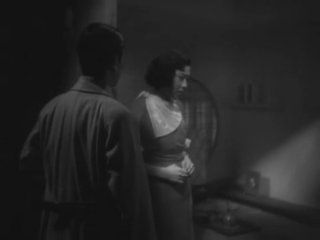It's frightening how well you feign innocence.

As it's International Workers' Day, it only seemed right to watch a film about a young woman who's forced to take up the world's oldest profession -- after a fashion. Made in 1936, Osaka Elegy is the earliest film in the Eclipse set Kenji Mizoguchi's Fallen Women, and it finds the fledgling director playing with some of the pet themes that he would return to again and again over the course of his long career. (It also sees him lingering on some fabulous nighttime shots of an Osaka that's all lit up and ready to facilitate the peddling of some flesh.)
Isuzu Yamada stars as a switchboard operator for a pharmaceuticals company who grudgingly agrees to become her boss's mistress in order to get her father (Seiichi Takegawa) off the hook for some financial malfeasance. It's not as simple as that, though, since her boss (Benkei Shiganoya) isn't too good about covering his tracks, as evidenced by the way his suspicious wife (Yôko Umemura) catches them twice. The first time, at the performance of a kabuki play (a detail that has great resonance for a story about people who are manipulated by forces they can't perceive), they are bailed out by the boss's quick-thinking colleague (Eitarô Shindô), who poses as Yamada's beau, but the second time they're not so lucky. Thanks to his dummkopf doctor (Kunio Tamura), Umemura actually tracks them down to their art-deco love nest, from which our heroine is summarily expelled.
From there, Yamada's fortunes scarcely improve. By chance she runs into her little sister (Chiyoko Ôkura), who all but calls her a slut in the same breath that she lets slip that their brother (Shinpachiro Asaka) needs to pay his tuition bill (a hefty 200 yen) before he'll be allowed to graduate. Yamada gets the money from Shindô, who insists there are some strings attached, but she pins her hopes on a former co-worker (Kensaku Hara) whose marriage proposal she dearly wants to accept, but first she has to confess all to him. Turns out she has every reason to worry about how far she'll fall without him to save her, for in short order Shindô has her arrested and her sordid story becomes front-page news, which is around the time Hara makes himself scarce. The police inspector on the case (Takashi Shimura in one of his earliest screen appearances) ultimately drops the charges because it's her first offense, but as far as Yamada's family is concerned she's damaged goods and they give her the cold shoulder. Talk about ingratitude.